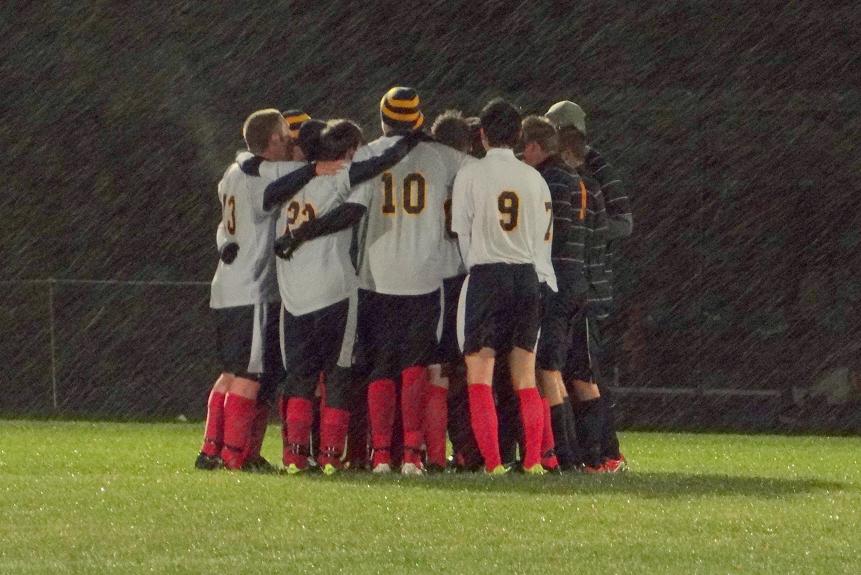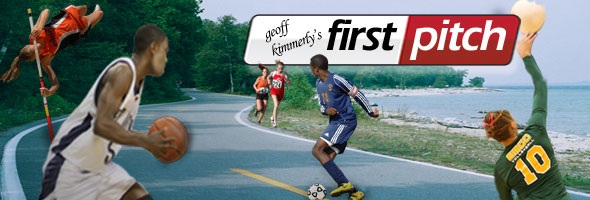
No Damper on this Rivalry
October 20, 2011
FREELAND – The Ovid-Elsie and Ithaca boys soccer teams play each other at least twice a season as members of the Tri-Valley Conference, and often again during the postseason. Usually those games are meaningful – both regularly are among the best in their league as well as district title contenders.
But a gesture brought on by Wednesday’s seemingly statewide downpour likely will become one of the most memorable moments of this rivalry.
Ovid-Elsie jumped to 6-0 lead by halftime of the team’s Division 3 district semifinal at Freeland. With winds blowing rain sideways and 30-40 mph, chances of an Ithaca comeback were slim.
The Yellowjackets had another bad turn when one of their defenders was injured running down an Ovid-Elsie breakaway early in the second half. Play stopped, and the Marauders’ defenders stood together to block each other from the rain and wind.
Soon, they were joined by two Ithaca forwards. Then midfielders from both sides joined. Eventually, all 21 players still on the field, aside from the one who was injured, formed a tight huddle near Ovid-Elsie’s net. The huddle was completed when Marauders goalkeeper Thomas Powers slid in among the mass of legs and emerged in the middle of the group.
“One of my players told me they were just playing rock, paper, scissors in there,” Ovid-Elsie coach Craig Thelen said.
“Both teams respect each other, play hard against each other. We split this season, and we split wins almost every season.”
Separated by 25 miles, the Ovid-Elsie and Ithaca players know each other only through soccer, Thelen said. But the rivalry, while physical, is friendly. That mutual respect likely grew Thursday.
As the person who submitted this photo wrote, “Like they say, ‘It's not whether you win or lose, it is how you play the game.’ This is how we should play a little more often.”
Ovid-Elsie eventually won 8-2, and faces Alma in the district final at 6 p.m. Saturday, also in Freeland.

Things change; lessons are the same
February 29, 2012
Let's start with the obvious: High school sports have evolved a bit since 1927.
But the MHSAA Bulletin from March of that year -- dug up by one of our directors on another research pursuit -- reminds us how some of our challenges remain the same.
Below are a few excerpts from the section titled "Baseball and Sportsmanship." Keep in mind, baseball was the football and basketball of the first half of the 1900s. The 1927 New York Yankees arguably were the greatest baseball team of all-time, finishing 110-44 thanks to Babe Ruth, Lou Gehrig and others.
Those names alone make us think in a historical context -- which makes the parallel between today and the following that much more intriguing:
Baseball games furnish a difficult problem to schools in the matter of sportsmanship, spectator control and their education.
Many more people are familiar with the game of baseball and its rules than is true of either football or basketball. Consequently, they feel even more qualified to criticize.
In many places, absence of seating facilities bring the spectators into close proximity to players with the result that criticism of players and of the official and sometimes abusive remarks to the visiting team can occur. No school can hope to improve this situation by ignoring it.
The MHSAA Bulletin went on to cite suggestions for improvement that had been published by the Delaware association. Again, a sampling:
Treat the visiting team as guests, not as deadly enemies. Small youngsters often offend through ignorance. Educate them along this line.
Fair and impartial applause of good plays by either side should be encouraged in the student body, and the outside fans will soon fall in line.
"Razzing" or "riding" visiting players is poor sportsmanship.
Caution your boys to pay no attention to the "grandstand experts" who feel it their duty to offer suggestions as to the work of the team. They can sometimes do more harm in an hour than can be overcome in days of practice.
And a final note from the 1927 MHSAA on the subject:
An athletic contest properly staged and handled creates a favorable impression on the part of visitors toward your school and community. A game that deteriorates into a backyard squabble hurts not only the school and its executives, but the town as well.

